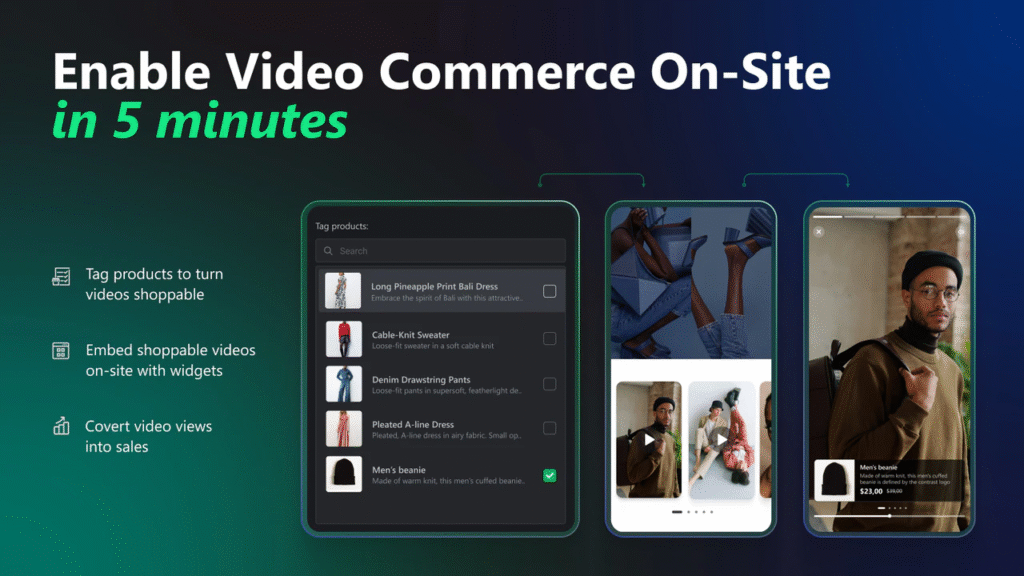Videos are everywhere now. People love watching short clips — whether it’s a product demo, a “how-to,” or just someone using a cool item. But what’s even better than a regular video? A video that lets people shop while they watch.
That’s why shoppable videos are trending in 2025. They let customers see your product in action and buy it right there. No extra steps. No link in bio. Just tap and go.
And the best part? You don’t need to be a tech pro to use them. Today, there are amazing platforms that help you create and host shoppable videos easily – even if you’re a small business or a solo founder.
Why ReelUp Is the Best Place to Start
Let’s begin with one of the most beginner-friendly and powerful tools: ReelUp.
ReelUp helps you turn your existing videos into fully interactive shoppable videos. You can upload a product demo, a tutorial, or even a simple unboxing. Then, tag your products inside the video. When someone watches, they can click on what they like and shop without leaving the screen.
It works perfectly for websites, landing pages, emails, and even social media. Plus, you get smart data – like how many people watched, clicked, and bought — so you can see what works and what doesn’t. For anyone just starting out or wanting an easy solution, ReelUp is a top pick in 2025.
1. Vimeo Interactive
Vimeo isn’t just for hosting videos anymore. With their interactive video features, you can now add clickable product links, calls-to-action, and more. If you already use Vimeo, this can be a great upgrade.
Pros:
- Clean and high-quality video hosting
- Tools to customize the player
- Trusted by many big brands
Cons:
- More technical setup
- Not built just for shopping
Best for: Brands that want total control over their video content and already use Vimeo.
2. Tolstoy
Tolstoy is another solid platform that focuses on interactive, personalized videos. You can create a video that branches based on viewer choices — like a quiz or guided shopping video. It also supports shoppable video features, letting you tag products and link them to your store.
Pros:
- Interactive “choose-your-own-path” style
- Shopify integration
- Good for quizzes or product finders
Cons:
- Takes a bit longer to build complex videos
Best for: Brands with multiple product lines and fun storytelling ideas.
3. Firework
Firework offers short-form vertical videos (like Instagram Reels or TikToks) that are also shoppable. Their setup is mobile-first, which is great since most customers shop on their phones.
They also provide livestream video shopping tools, which are becoming popular for flash sales and launches.
Pros:
- Mobile-friendly
- Great for vertical video
- Offers live shopping tools
Cons:
- Can be expensive for small businesses
- Not as beginner-focused
Best for: Larger e-commerce stores or fast-growing D2C brands.
4. Bambuser
Bambuser is mostly known for live video shopping. But in 2025, they’ve expanded into pre-recorded shoppable videos too.
If you like doing live shows — like Q&As, launches, or influencer takeovers — Bambuser could be a strong fit.
Pros:
- Strong live shopping tools
- Good for high engagement
- Trusted by fashion and beauty brands
Cons:
- More setup required
- Works best with live audiences
Best for: Beauty, fashion, and lifestyle brands doing live sales.
5. Instagram & TikTok (Built-In Options)
Both Instagram and TikTok now offer some level of shoppable video features — like product tagging in Reels and Stories.
These aren’t full-feature platforms like ReelUp, but they’re still useful for quick wins and building awareness.
Pros:
- Free and familiar
- Easy to tag products
- Great for reaching new users
Cons:
- Limited analytics
- Can’t customize the shopping journey
- Viewers still need to leave the platform sometimes
Best for: Any brand already active on social media.
What to Look for in a Shoppable Video Platform
Before you choose a platform, here are a few things to think about:
- Is it easy to use? You shouldn’t need to hire a tech team to get started.
- Does it show real data? Metrics like views, clicks, and conversions help you improve.
- Can you use it on your site and emails? You want videos that work wherever your customer is.
- Can you grow with it? Pick a tool that works now and still works as you scale.
Final Thoughts: Start Simple, Grow Fast
In 2025, shoppable videos are no longer optional — they’re how smart brands sell. They let you tell a story, show your product, and close the sale — all in one video.
If you’re already making content, you’re halfway there. Now, it’s about using the right platform to make your videos shoppable.
For most beginners and small businesses, ReelUp is the easiest and most affordable way to get started. You don’t need fancy tools – just a good product, a real video, and a simple click-to-buy setup.
So go ahead – take one video you already made, upload it to ReelUp, and tag your first product. Your next customer could be just one tap away.

